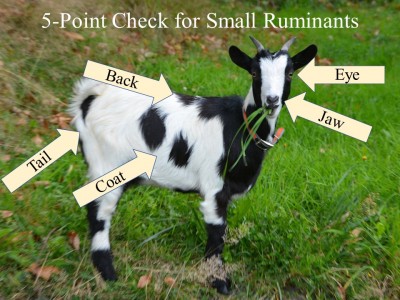5-Point Checks for Small Ruminants
Amy Barkley, Livestock Specialist
Southwest New York Dairy, Livestock and Field Crops Program

Internal parasites are a common problem for small ruminants. No matter the production system, time of year, or breed, it is fair to say that all small ruminants have a parasite load to some extent. Though there is a wide variety of internal parasites out there, the internal parasite of greatest concern is the barber pole worm (Haemonchus contortus). If an individual has high loads of this parasite, the resulting volume of blood drawn by the worms results in anemia and lack of overall nutrition getting to the animal's body. Other parasites are less likely to, but can, become problems in production scenarios as well.
Past recommendations, including the monthly treatment of an entire flock, and treating before moving to new pasture, are now antiquated as research has shown that these methods increase the potential for parasite resistance. As resistance to dewormers grows, an integrated pest management approach is called for. In addition to more intensive pasture rotation, selective breeding for resistance, and limiting access to pastures immediately surrounding the barn, a 5-point check can be used to determine the need to deworm select individuals in a herd or flock.
A 5-point check is a comprehensive analysis of an animal's condition to determine if it is exhibiting signs related to a potential high internal parasite load, using an evaluation at 5 points over the animal's body. Not all animals will exhibit all signs, so a combination of the intensity of the signs present and experience can help producers make timely management decisions.
1.) The Eye: FAMACHA (FAffa MAlan CHArt) Scoring
This scoring system looks primarily for the effects of the barber pole worm (Haemonchus contortus) by comparing the color of the eyes' mucous membranes to a known graded color standard. This indicates the level of anemia within an animal. The scores range from 1-5, with 1 being normal, and 5 being the most clinically severe. Those animals which exhibit scores of 4 and 5 must be treated with an effective dewormer, but the other checks in the 5-point system will indicate which individual animals showing score of 3 should be treated as well.
FAMACHA certification courses can be taken in-person through your local extension office, or online through the University of Rhode Island (https://web.uri.edu/sheepngoat/famacha/). This course will teach proper scoring techniques and deworming decision-making tools. Completion is necessary for the procurement of a FAMACHA card.
2.) The Jaw
Anemia in small ruminants is mostly the result of a blood-feeding parasite infestation, with the primary parasite being the barber pole worm. Bottle jaw is the result of severe anemia, where the lack of blood proteins and/or improper blood pressure can result in fluid buildup below the lower jaw. If bottle jaw is seen in a small ruminant, confirm the level of infestation through the FAMACHA scoring system, and treat those animals affected.
3.) The Back
The back is scored on a scale of 1-5 using a body condition score (BCS) series to determine the nutritional status of an animal, where animals scoring higher on this scale have a higher body condition (more muscle and fat). The score should fall between a 2.5 and a 4, with lower scores indicating a potential health problem. Instructions for proper body condition scoring can be found through the Michigan State University Extension (https://www.canr.msu.edu/news/body_condition_scoring_in_goats).
4.) The Tail
Fecal quality can help determine the health status of an animal. Many worms are known to cause scours, and therefore, the degree of fecal soiling can be indicative of a parasite load. This score is on a scale of 0-5, with 0 being no fecal soiling and 5 being very severe, watery diarrhea that extends to the hocks. Animals with scores of 3-5 should be considered for treatment, though it's important to note that a high score may be indicative of another condition, such as stress or diet. It should also be noted that evidence exists that some animals with genetic resistance may present with diarrhea as a result of their heightened immune response against the parasites.
5.) The Coat
A healthy animal's coat should be even, full, and lustrous. Lack of proper nutrition due to internal parasite feeding can result in a rough, dull hair coat.
---
In a herd or flock, those animals which are under biological stress are most likely to be susceptible to the negative effects of worms. These include ewes or does in late pregnancy or lactation and young lambs and kids. If there are not enough resources available on-farm to make a 5-point check on all members of a herd or flock, consideration for deworming should focus on these animals, as they are most likely to have the highest parasite loads.
This article was written by Livestock and Beginning Farm Specialist, Amy Barkley (amb544@cornell.edu / (716) 640-0844). More information on small ruminant parasite management can be found by visiting the Cornell Small Ruminant Parasite Research Site at http://blogs.cornell.edu/smallruminantparasites/.
Upcoming Events
WEBINAR - Automated Milking Systems Efficiency: Balancing Focus on Individual Cows and System Optimization
May 8, 2024
Please join Cornell the SWNY team and MSU Extension for our talk with Dr. Pablo Silva Boloña on improving efficiency of Automated milking systems by focusing on milking settings for individual and group success.
Broiler Field Day at Sunny Cove Farm
June 6, 2024
Alfred Station, NY
Join us for a field day to explore broiler production, processing, and finances. Meghan Snyder of Sunny Cove Farm will be our host. She raises small batches of organic broilers, processing them on-farm under the 1,000 bird exemption.
Stockmanship and Stewardship 2024
October 25, 2024
Hamburg, NY
Save the date!! The event is one of 4 across the US and is a two-day educational experience featuring low-stress cattle handling demonstrations, Beef Quality Assurance educational sessions, facility design sessions, and industry updates.
Announcements
No announcements at this time.





